We’ve all heard about how a good diet and regular exercise will improve our health and reduce our chances of acquiring heart disease, and other chronic conditions later in life.
But while diet and exercise will definitely put you on the right track to improving your health and wellbeing, there’s another important component to this recipe that gets shuffled aside frequently.
If you’re wondering what that is, it’s sleep.
Yes, one of the best things you can do to help you reach any health and fitness goals you have is…to get some sleep.
What are we risking if we get less than the recommended minimum of seven hours sleep a night?
No part of our body remains untouched by sleep deprivation. A lack of sleep has a powerful effect on us, among other things, Alzheimer’s disease, cancer, diabetes, reproductive health, cardiovascular disease, obesity and mental health. That’s because sleep restores the immune system, balances hormone levels, lowers blood pressure, cleanses toxins from the brain, and much more.
It seems that sleep needs to be taking its place next to exercise and diet as an essential tool for your health and wellbeing. But what if you can’t sleep? What can you do to increase your chances of getting more sleep?
- Prioritise sleep. According to Australia’s Sleep Health Foundation one problem many of us have is taking sleep for granted and feeling that it is a waste of time. Time spent in bed is time well spent as there are many important things your brain must do during sleep. Sleep is vital to preserve new memories, for instance, and future proofs that information in your brain.
- Stick to a sleep schedule. As people have a hard time adjusting to changes in sleep patterns it’s important to go to bed and wake up at the same time each day. Sleeping late on weekends doesn’t make up for poor sleep during the week and can contribute to ‘social jetlag’, which makes us even sleepier on Monday. If necessary, you can always set an alarm for bedtime.
- Skip the caffeine. Caffeine is the most widely used (and abused) psychoactive stimulant in the world and can mask sleep disorders and sleep deprivation. It works by blocking the actions of sleep-related chemicals in the brain, tricking you into feeling alert. This may be helpful for shift workers but can ruin sleep if consumed too close to bedtime. Its effects can also last up to seven hours, meaning a lunchtime coffee could disrupt your sleep that night. Many products containing caffeine can contribute to a restless night, including energy drinks, Cola drinks, black and green tea, hot chocolate, milky iced coffee, and even chocolate ice-cream.
- Seek out the sun. Sun exposure during the day helps us to regulate sleeping patterns. Try to get outside in natural sunlight for at least 30 minutes a day.
- Deal with any stress. It’s normal to wake up once or twice in the night but if you regularly have trouble getting back to sleep then stress or anxiety could be the cause. Worrying about your sleep can make it worse as it creates a vicious cycle. Exercise can help – even fitting in a 20 to 30 minute walk after work will lower your stress, as will relaxation exercises such as yoga or meditation. Alcohol may appear to take the edge off stress and help you get to sleep but you pay the price later, as it interrupts your sleep during the night and prevents restorative REM sleep. If your mind just can’t shut down, see your GP. There are many things you can try and specialists who can help you.
Because any improvement in your habits starts from knowing what those habits are, Healthworks offer sleep consultations. The consultations take you through your sleep habits and provide you with tips and ideas on how to improve your sleep to help you reach your wellbeing goals. As they are virtual, all workers are able to access the service, making it ideal for remote offices and work-from-home staff.

